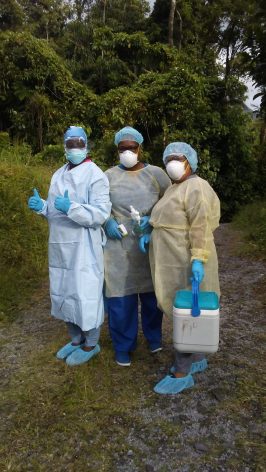The Caribbean Looks to Research for Answers to COVID-19, NCDs and Climate Change Challenges

UNITED NATIONS, Jun 17 (IPS) - In 1956, the Caribbean held its first major scientific meeting, organised by the Standing Advisory Committee for Medical Research in the British Caribbean. At the time, the Mayaro Virus, a dengue-like viral disease often called ‘jungle flu’ had just been identified as a new human disease agent by W.G Downs and G.H Wattley in Trinidad.
Fast forward six decades and this week, the Caribbean Regional Public Health Agency (CARPHA) is hosting the 65th Health Research Conference, in the backdrop of the COVID-19 pandemic, which has stretched public health institutions, upended businesses and crippled regional economies.
A pandemic that brought the world to its knees would spell hardship enough, but it is part of a triple threat that public health officials say demands evidence and research-based responses.
According to CARPHA, Non-communicable Diseases (NDCs) are the leading cause of death in the region and make up the greatest cost to health systems and economies.
Member states are also vulnerable to the environmental, economic and health impacts of a changing climate. With many small island states grappling with increasingly intense storms, the region is on the frontlines of the climate emergency.
“We cannot forget the La Soufriere Volcanic explosion, we have had flooding in Guyana, Dengue outbreaks, economic standstills, all at once. The public health challenges have been unceasing,” says Dr. Joy St. John, CARPHA Executive Director.
“So, this year’s research conference presentations are even more important, as we search for evidence to inform policy and programming, that combat climate change, in this new world COVID-19 is forcing us to create.”
“NCDs have also caused deaths among the younger persons with chronic disease. We are therefore happy that in 2021, the 65th conference, which is the longest-running in the Caribbean, will be distinguished by the scientific ingenuity and innovation of some of this world’s most resilient, and determined people — the people of the Caribbean.”
The four-day research forum which started on Jun. 16 will feature the latest health research findings from the Caribbean.
Organisers are hoping it will guide member states coping with the shocks of the ongoing COVID-19 Pandemic, but concede that even as the region leans heavily on research and science for recovery, push back remains. This includes what they describe as the ‘ever-present vaccine hesitancy.’
CARPHA has been tweaking its communication messages, hoping to win over those who are reluctant to get vaccinated.
“With the return to cruise tourism and some cruise lines not requiring immunisation of passengers, the speed of delivery of vaccines will be critical to slowing the disease as well as ‘variant-of-concern’ transmission. Economic downturn will not be halted if the Region is plagued by repeated outbreaks in the tourism sector. No one wants another regional lockdown 2.0,” said St. John.
Public health officials say successful vaccination campaigns are a cornerstone for reopening, but some states appear to be hitting an inoculation plateau.
Antigua and Barbuda is among the CARPHA member states recording success in its vaccination campaign. 59 percent of its adult population has received at least one dose of the AstraZeneca vaccine.
“Being responsive to vaccine demand, creating ease of access by utilising mobile services in the community in addition to static public vaccination sites in strategic locations. Heightened traditional media and social visibility including the use of influencers. We have weekly strategy meetings to respond to issues arising at various levels of the process,” Chair of the Public Education Sub-Committee of the National Coordinating Committee for the COVID-19 Vaccine Dr. Janelle Charles-Williams told IPS.
The conference is hoping to build on cooperation in health and arm policymakers with the latest research findings to tackle the region’s most pressing health challenges.
From a survey that seeks to understand the rationale for COVID-19 vaccine hesitancy, studies on diabetes, physical activity, cancer health services, maternal and child health, rainwater harvesting and lectures from renowned scientists, the goal is to also prepare for the next pandemic and bolster regional public health care systems.
“Although many Caribbean states have successfully avoided wide-spread transmission of COVID-19, I know the pandemic has hit you hard in other ways such as lower revenues from tourism. Even when/once the pandemic subsides, we know that you will still face many of the same health challenges you had before including climate change and non-communicable diseases,” World Health Organisation Director-General Tedros Ghebreyesus told the conference on Wednesday.
Thirty-two research papers were presented at that first scientific meeting in 1956. That figure has grown to an average of 92 a year. CARPHA is hoping that cutting-edge research on the Caribbean’s trio of threats will spur evidence-based decisions on healthcare delivery and programming.
© Inter Press Service (2021) — All Rights Reserved. Original source: Inter Press Service
 Global Issues
Global Issues